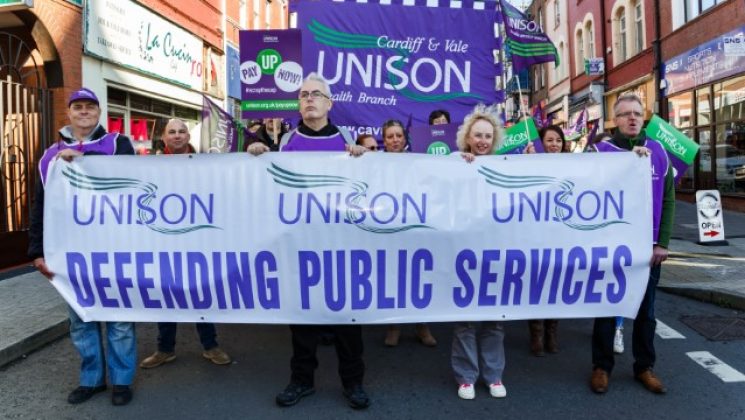Photo credits: Tracey Paddison
28,100 local authority jobs have been lost in Wales since 2010 as a result of severe spending cuts driven by the UK Westminster government. This is equivalent to losing the seven largest private sector employers in Wales, according to a new report published today (Tuesday).
UNISON Cymru Wales’ Audit of Austerity states that Tata Steel; Admiral; Airbus; Arriva Trains Wales/Transport for Wales, Ford; S.A. Brain and Principality together have a combined workforce of 27,500. Their disappearance would be viewed as catastrophic and demand immediate government intervention and investment.
By contrast, the loss of 28,100 jobs in local councils over the last eight years has not generated the same headlines or pressure on the UK government or in Cardiff Bay. This is despite the fact that local government is the economic bedrock of Wales, spending £3.5bn and employing over 10 per cent of the Welsh workforce.
UNISON Cymru Wales’ Audit of Austerity key points: –
- For every 6 local authority jobs across Wales in 2010, there are now only 5
- More than 500 jobs have gone in 19 of the 22 councils in Wales
- More than 1,000 jobs have gone in 15 councils
- More than 2,000 jobs have gone in 6 councils
- Women are more adversely affected than men; women were employed in 18,400 of the 28,100 jobs that have gone
- Welsh council spending would be £1.59billion higher if it had kept pace with inflation
- Councils face multi-million pound budget gaps between now and 2022 at a time when Wales’ population is growing

Bethan Thomas, UNISON Cymru Wales head of local government said,
“If 28,000 private sector jobs were threatened, governments would drop everything to ask the business ‘how can we help?’ There would be promises of investment and a special taskforce.
“Yet, the Conservative government is completely indifferent to the same number of public service jobs losses it has caused in Wales by starving Welsh government and Welsh councils of money.
“Stripping funds available to councils means we have lost an army of librarians; youth workers; school support staff; leisure centre staff; carers; highways maintenance workers; social workers; environmental health inspectors and more. Council services are disappearing before our eyes.
“Public demand for services is still there. People expect the bins to be emptied, the roads to be swept, the vulnerable to be cared for and their children to be well educated.
“We are at crisis point. It is only thanks to the dedication of council workers going beyond the call that our local services are functioning at all. There is no more scope for cuts in public services.”
UNISON is calling for a halt to the UK Conservative government austerity programme and for investment in vital public services. Even though Welsh government recently provided additional monies to local authorities, there is still a real term cut to their funding and it does not address the cumulative effect of nearly a decade of austerity.
UNISON believes there are several things that can be done by Welsh Government to assist in protecting local public services and the trade union continues to lobby the Welsh Assembly.
Notes to editors:
- Link to UNISON’s report: Audit of Austerity
- According to the ONS Quarterly Public Sector Employment Survey 28,100 council jobs were lost between Q1 2010 and Q1 2018 – equivalent to losing the seven largest private sector employers in Wales
- For every 6 council jobs in Q1 2010 there are only 5 in Q1 2018
- Welsh councils spend £3.5bn a year on goods and services and councils employ over 10 per cent of the Welsh workforce
- Women have been more adversely affected than men; women made up 18,400 of the 28,100 jobs that have gone. Now 7,400 fewer men and 10,100 few women are employed full-time; 2,300 fewer men and 8,300 fewer women are employed part-time
- In 2010/11 gross revenue (day-to-day) spending by local councils in Wales was £7.64bn. By 2017/18 that figure had increased to just over £8bn but if it had kept pace with inflation it would have been £9.02bn using Consumer Price Index (CPI) and £9.59bn using Retail Price Index (RPI)
- In 2011, the population in Wales was 3.06m. By 2016, this had risen to 3.113m and it is projected to rise to 3.173m by 2021
- UNISON’s report lays bares the terrible social cost of austerity: libraries; youth clubs; community centres and household waste centres have been shut; sports centres have not been refurbished and there are fewer environmental health inspections of local cafes. Those needing care might not be getting the assistance they need and there are fewer social workers to protect children at risk. Street lights are switched off at night making our roads more dangerous.
- UNISON believes there are several things that can be done by Welsh Government to assist in protecting local public services:
(a) Legislate to provide a ‘power of general competence’ for local authorities in Wales.
(b) Increase revenue support grant by at least the percentage increase in the funding from HM Treasury so that the aggregate external financing (revenue) to local authorities returns to at least 2013/14 levels in real terms
(c) Encourage local authorities to use their existing powers to provide goods and services to other parts of the public sector in Wales, and to trade by developing the range of goods and services that can be supplied to members of the public in general and to the private sector more generally
(d) Work with local authorities in Wales to release existing revenue streams through, for example debt refinancing, prudent changes to MRP policy utilising the opportunities afforded by historically low interest rates
(e) The introduction of indicative three yearly grant settlements
- UNISON Cymru Wales supports reform of local government including use of mergers within the boundaries of health boards provided that there are no compulsory redundancies and that any proposals are supported by Welsh Government with an appropriate financial package to ensure the long term sustainability of the local government sector.
- UNISON’s official report launch is on Tuesday 27 November at 5pm, Caerphilly County Borough Council Headquarters, Ty Penallta, Tredomen Park, Ystrad Mynach, Hengoed, CF82 7PG
- Journalists wishing to attend to interview public service workers and UNISON spokespeople should advise Alastair Gittins in advance (details below).
| Employer | Number of employees | Main locations | |
| Tata Steel | 7000 | Port Talbot, Llanwern, Shotton, Llanelli, Newport and Caerphilly | |
| Admiral | 7000 | Cardiff, Newport and Swansea | |
| Airbus | 6400 | Broughton (Flintshire and Newport | |
| Arriva | 2200 | ||
| Ford | 2000 | Bridgend | |
| S.A Brain | 1800 | Cardiff | |
| Principality | 1100 |
Contact:
Alastair Gittins, UNISON Press Officer on 07816 538397

